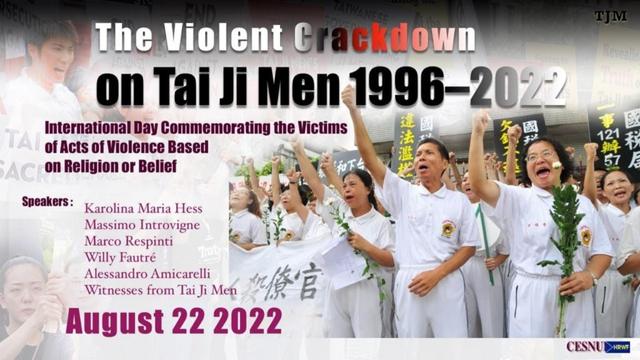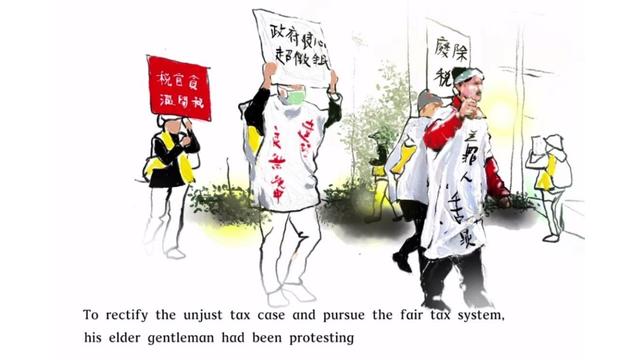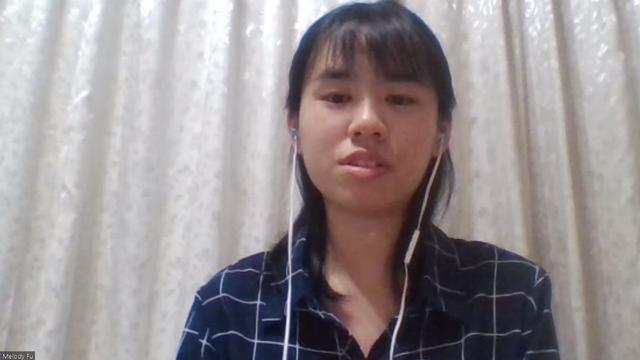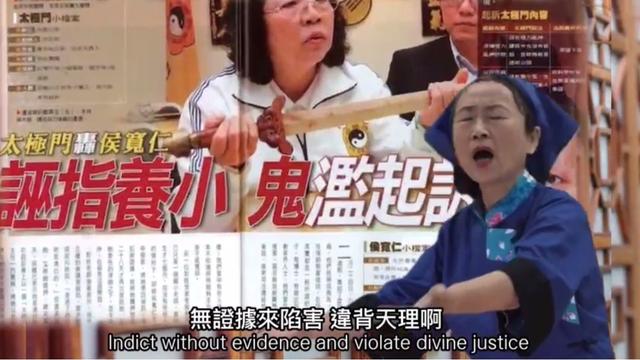A webinar discussed different forms of violence against religious and spiritual movements and the Tai Ji Men case.
by Daniela Bovolenta

August 22, 2022, was the United Nations International Day Commemorating the Victims of Acts of Violence Based on Religion or Belief. CESNUR, the Center for Studies on New Religions, and Human Rights Without Frontiers organized one of their bi-monthly webinars on the Tai Ji Men case, on “The Violent Crackdown on Tai Ji Men 1996–2022.”
Karolina Maria Hess, a researcher at the Institute of Sociology, University of Silesia, Katowice, introduced the webinar, and presented a video commemorating a senior Tai Ji Men dizi (disciple) who passed away after many years of protests seeking tax justice. Part of his health problems came from a cerebral concussion he suffered when five security guards and police officers confronted and beat him while he was protesting at the National Taxation Bureau in Taipei. He continued writing letters, however, and participating in protests until his last days.

In her introduction, Hess mentioned three forms of violence targeting religious and spiritual minorities, of which Tai Ji Men has been a victim in Taiwan. First is verbal violence, in the shape of hate speech and media slander. Second, legal and administrative violence hit Tai Ji Men through ill-founded legal and tax cases. Third, unfortunately Tai Ji Men Shifu (Grand Master) Dr. Hong Tao-Tze and dizi were also victims of physical violence, as evidenced by the mistreatment Dr. Hong had to suffer during his unjust detention following the 1996 raid, and by the arrest in 2020 of a 60-year-old woman, Ms. Huang, during a peaceful demonstration in Hsinchu.

Hess then introduced the first two speakers. Massimo Introvigne, an Italian sociologist and managing director of CESNUR, who also serves as editor-in-chief of Bitter Winter, focused on an alarming phenomenon. When new religious and spiritual movements are victims of violence, their opponents and some media try to twist the narrative and claim that the crimes were somewhat their fault. Introvigne gave as examples the assassinations of a Scientologist in Australia in 2019, and of a member of the Christian new religious movement Shincheonji, and her sister-in-law, in South Korea in 2022.
The most spectacular case, Introvigne said, is now the murder of former Japanese Prime Minister Shinzo Abe by an assassin who hated the Unification Church, of which is mother is a member, and wanted to punish Abe for having participated in events of an organization connected with that Church. The assassin also wanted to kill the leader of the Unification Church. Yet, most media blamed the Unification Church as if it were the perpetrator rather than the victim.
This strategy of switching positions between perpetrator and victim is not new, Introvigne concluded. Prosecutor Hou Kuan-Jen used it when he started the Tai Ji Men case in 1996. Tai Ji Men was clearly the victim of a politically motivated persecution, yet Hou told the media Dr. Hong and Tai Ji Men were guilty of imaginary crimes.
Marco Respinti, an Italian scholar and journalist and the director-in-charge of Bitter Winter, offered a reflection on the distinction between “force,” a word that indicates a positive principle regulating the universe, both in modern science and in the literary sagas of “Star Wars” and “Lord of the Rings,” and “violence,” a perverted use of force. The notion of a universal “force,” Respinti noted, is often connected with religion and spirituality. Religions can be violent themselves, he said, but more often they are at the receiving end of violence, perpetrated by totalitarian regimes but sometimes also by democratic states, as the Tai Ji Men case demonstrates.
The full video of the webinar
Tai Ji Men’s work for peace, love, and conscience based on the harmony of yin and yang, and its teaching of qigong and self-cultivation, Respinti stated, embody the idea of “force” as an intrinsically spiritual principle pervading the universe. Conversely, Tai Ji Men has been a victim of violence in the shape of persecution. This will not last forever, Respinti concluded, as “in the end spiritual force always wins against brutal violence.”
Willy Fautré, the co-founder and director of Human Rights Without Frontiers, mentioned that the United Nations International Day Commemorating the Victims of Acts of Violence Based on Religion or Belief is always a sad day because, as we commemorate victims of past persecution, we know that violence against believers continues to go on today. In more than forty countries, Fautré said, state violence is perpetrated against religious minorities. Ukraine is being added to the list, as the Russian invaders persecute religions they perceive as supporting the national resistance. State violence risks to remain unreported, Fautré concluded, when it uses administrative tools such as taxes. However, the Tai Ji Men case shows that this form of state violence against freedom of religion or belief is also dangerous.

Fautré then presented a video on Tai Ji Men’s Bell of World Peace and Love, a symbolic artifact that political and religious leaders are asked to ring, signifying their commitment to work for a better world. 425 leaders from 128 nations rang the Bell, the video explained, and 26 were added this summer in Stockholm, Istanbul, and Washington DC. Legal scholars Ken Jacobsen and Massimo Introvigne also rang the Bell in recent Tai Ji Men events in the United States.
Fautré then presented five Tai Ji Men dizi who offered their testimonies. Jimmy Chiang, a manager in a financial institution, shared his experience of physical and psychological improvement he achieved by practicing Qigong in Tai Ji Men. The 1996 crackdown happened before he joined Tai Ji Men in 2009, but he understood its context and effects through his work for legal and tax reform. He came to realize that freedom of religion or belief and the two United Nations Human Rights Covenants, despite having been incorporated into domestic law in 2009, have not been fully implemented in Taiwan, Chiang said, as proved by the Tai Ji Men case.
Kate Chen, who works as executive assistant, also mentioned the failures in implementing the Two Covenants in Taiwan, noted by both local and international experts. Chen reported that in June this year she traveled with Sweden with Dr. Hong and with other dizi to attend the United Nations Stockholm+50 event, organized to commemorate the 50th anniversary of the 1972 United Nations Environment Conference. When in Stockholm, she visited the museum where the magnificent Vasa ship is on display, rescued from the sea after it sank in its maiden voyage in 1628. Sweden was not a democracy at that time, but the government investigated the incident and indemnified the relatives of the thirty sailors who died. We expect even more, Chen concluded, from the democratic government of Taiwan, who should investigate the “state violence” perpetrated against Tai Ji Men and rectify its mistakes.
Ruby Liu, a fresh graduate, shared his experience of participating in the 2020 protests after sacred land intended for a self-cultivation center of Tai Ji Men was seized, auctioned off unsuccessfully, and confiscated based on an ill-founded tax bill, and notwithstanding Taiwan’s Supreme Court had established that Tai Ji Men has never been guilty of tax evasion. Liu also attended in June 2022 the International Religious Freedom (IRF) Summit in Washington DC and was among the dizi appealing to the international community for help with the Tai Ji Men case. She hopes that these international efforts will bear fruit soon, she concluded.

Melody Fu, a college student, reported that she also participated both in the 2020 protests and the 2022 Washington DC IRF Summit. She insisted on the fact that, despite being harassed and persecuted, Tai Ji Men, which she called her “second home,” did not cease its work on behalf of world love and peace. She experienced how at the IRF Summit Tai Ji Men dizi did not advocate for their case only, but also brought the Bell of World Peace and Love, and explained its meaning to the Summit participants and the influential leaders who rang it.
Yachi Tseng, a teacher in Taiwan, went back to the year 1996, when the Tai Ji Men case started. She was not yet 24 when all of a sudden she was thrown into a spiral of slander and harassment. Her own mother suggested she should leave Tai Ji Men, and her relatives and friends told her to remove a Tai Ji Men sticker she had on her car. She was even asked by a colleague about “raising goblins,” a false and ridiculous accusation Prosecutor Hou had used to slander Tai Ji Men. She hopes that the UN International Day Commemorating the Victims of Acts of Violence Based on Religion or Belief will be an opportunity to call for Taiwan to solve the Tai Ji Men case and “eliminate the residual poison of Martial Law buried behind democratic rule,” Tseng said.

Fautré mentioned that this year is the 21st anniversary of the San Jose, California, Academy of Tai Ji Men and invited the audience to the commemorative celebration of August 28. He then introduced Alessandro Amicarelli, a London-based human rights lawyer and the president of the European Federation for Freedom of Belief (FOB), who presented the conclusions of the webinar. Amicarelli observed that all speakers and testimonies insisted on the fact that state violence against religious and spiritual minorities is always supported by spreading slander and fake news, as Prosecutor Hou did in the case of Tai Ji Men. This has a consequence, Amicarelli said: any strategy aimed at defending persecuted minorities and solving the Tai Ji Men case should start from dispelling the falsehoods and telling the truth about both Tai Ji Men and the case.

The webinar concluded with a video featuring Tai Ji Men dizi from Taiwan’s Hakka ethnic minority. It presented inspiring stories by dizi who solved complicated physical and psychological problems by practicing Tai Ji Men Qigong, and a song recapitulating the Tai Ji Men case in musical form.
Source: Bitter Winter

